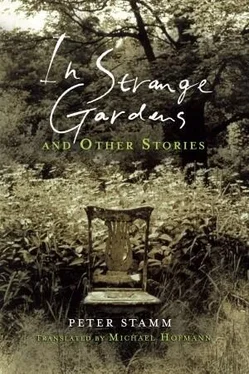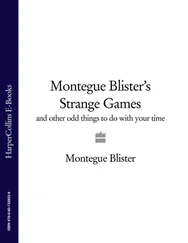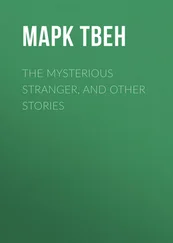“This is the end of our coffee,” I said. “We’ve just got powdered milk left.”
“And mushrooms and roots,” said Monika. “This is where the universal law kicks in.”
Michael didn’t say anything.
“We should start off before it begins raining again,” said Monika.
“I’m not getting in a boat again,” said Michael.
“Don’t be childish,” said Monika.
He stood up and disappeared into the forest. When we called after him to come back, he called out that he had to find his shoe first. He knew exactly where he had lost it. We packed our things, and also those of Sandra and Michael. We roped their canoe to ours. When we were done, we called Michael again. He made no reply, but we heard him in the underbrush nearby.
“If we don’t set out now, we won’t get there today,” said Monika. “Come on, let’s get him.”
We followed Michael into the forest. As we got closer to him, he moved away, and when we went faster, he went faster as well.
“That’s enough now,” called Monika. “Stop right where you are.”
“We have to wait for Sandra,” he called back. At least he had stopped walking. When we had caught him up, he said it again: “We have to wait for Sandra.”
“Why didn’t the two of you just wait for us,” I said. “You knew we weren’t far behind.”
“Sandra said you wouldn’t stop,” said Michael, “just because we overtook you. She thought you’d be mad at us. And because she hadn’t tied the baggage on. She said you’d laugh at us.”
“Are you crazy?” said Monika. “This isn’t some kind of competition. Cow.”
Michael bent down.
“My shoe must be very nearby,” he said with a pathetic voice.
“Fuck your shoe,” said Monika. I’d never seen her so angry. I could hear that it had begun raining again, but the drops couldn’t get through the thick canopy of leaves. “We’re going on now. And you’re coming with us. We can leave a note for her.”
“What about my shoe?”
“Leave it,” screamed Monika. “We couldn’t sleep all night because of your stinking feet. You must have got a fungal infection or something. And now we’re going.”
Michael was cowed and silent, and followed along behind us. Monika scribbled a note on a piece of paper, put it in a polythene bag, and attached that to a tree at eye level. She seemed to have calmed down.
“This isn’t a game,” she said to Michael. “This is a big, wild forest. You can die here, you know, just like an animal.”
Our canoe was now low in the water. For a while the river snaked through the forest in tight curves, and then it widened out again, and it was easier to make headway. Toward noon, the sun briefly broke through the clouds. The trees were still dripping with moisture, and in the boat it smelled of our wet things. Once, we saw a hat caught in the boughs of a fallen tree in the water, and Michael said: “That’s my hat.”
Monika and I didn’t say anything, and, though it would have been easy to fish it out, we carried on. The current grew weaker. We were now passing through tall rushes, and finally we got out onto a big lake. In the haze we couldn’t make out the opposite shore. Monika looked at the map.
“The campsite is on the eastern shore, about six miles from here,” she said. “If we keep going, we should get there tonight.”
The wind was against us, and the canoe we were towing slowed us down as well. Monika and I paddled. Michael sat silently in the middle of the boat. Once I told him he should spell Monika. But he was so clumsy with the paddle that she soon took it out of his hands again. The wind grew fresher, and the waves lapped almost over the edge of the boat. We made barely any progress.
“At least when it was raining, there wasn’t any wind,” I said.
“Come on, don’t give up,” said Monika.
After that, we didn’t speak any more. The shore was all overgrown with reeds, and it all looked the same. Once, we steered the boat into the reeds, and stopped to eat some ham and crispbread. Then we paddled on. It was past seven before we finally reached the campsite. There was a man on the shore, who helped us get the boats onto land.
Michael vanished as soon as we had landed. Monika and I scrubbed our canoe clean. When we carried it overhead to the boathouse, we saw Michael and Sandra walking across the campsite in a tight embrace. They didn’t look in our direction. We put up our tent close to the shore, in the middle of people’s caravans.
I was showering when I saw Michael once more. He was wearing some plastic sandals, and shaving. He gave me a barely audible greeting.
“I expected Sandra to come at the head of a rescue party,” I said.
“She was going to come back for me,” he said.
When I got back to the tent, Monika was gone. The socks I had lent Michael were airing on the line. I threw them in the nearest garbage can. Monika came, bringing a bottle of Portuguese wine, which she dug up somewhere.
“I ran into Sandra while I was showering,” she said. “She was missing a tooth, at the front, in the middle. She didn’t say a word to me.”
We boiled some rice, opened a can of tuna, and drank the wine. Then, when it was almost completely dark, we walked down to the lake. We sat down on the pier.
“Do you think she would just have left him out there?” Monika asked.
“I don’t know,” I said. “Maybe because of the shoe.”
“And what about the tooth?”
Music drifted softly from the garden restaurant, and there was the sound of TV from one of the caravans. Otherwise, it was quiet.
“Strange,” I said, “do you remember there being any mosquitoes?”
Monika drew up her legs, and rested her face on her knees. She looked over the lake water for a long time. Then she turned her head, looked at me, and said: “Things always happen when you least expect them to.”
“I didn’t think anything like this would happen to us,” I said.
“Who knows,” said Monika, and she smiled. “Actually, I quite fancy sleeping with you. But only if you promise not to fall in love with me again.”
Whenever I think of Maria, I think of the evening she cooked for us. The rest of us were already sitting down at the table in the garden, and Maria stood in the doorway, with a flat dish in her hands. Her face was flushed from the heat in the kitchen, and she was beaming with pride in her work. Just at that moment, I felt incredibly sorry for her, and for the whole world, and for myself too, and I loved her more than I had ever loved her before. But I didn’t say anything, and she set the food down on the table, and we ate it.
We had gone to Italy as a group, Stefan and Anita, Maria and me. It had been Maria’s idea to visit the village of her grandfather. Her grandfather had emigrated to Switzerland many years ago as a young man, and even Maria’s father had only known their former home as a vacation place.
We stayed in a small, slightly run down rental cottage, in the middle of a pine-wood near the sea. There were other cottages dotted about the wood, most of them bigger and handsomer than ours. Not far away was a coastal promenade,with restaurants, hotels, and shops. The old part of the village was back from the coast, at the foot of some hills. We spent most of our time in the new part, in our cottage, because we didn’t have a car. Only once, after a late breakfast, did we call a taxi and visit the old village.
There was no one on the streets. From time to time a car drove by. We heard kitchen noises through an open window, and once we saw two black-clad women. Maria wanted to ask them about her grandfather, but before we could get near them they had vanished into one of the houses. We found a little bar that was open. We sat down at a table, and had something to drink. Maria asked the bar owner whether a family bearing her name lived in the village. He shrugged his shoulders and said he was from the north, and only knew the customers at the bar. And even with them, he mostly just knew their nicknames and Christian names.
Читать дальше












